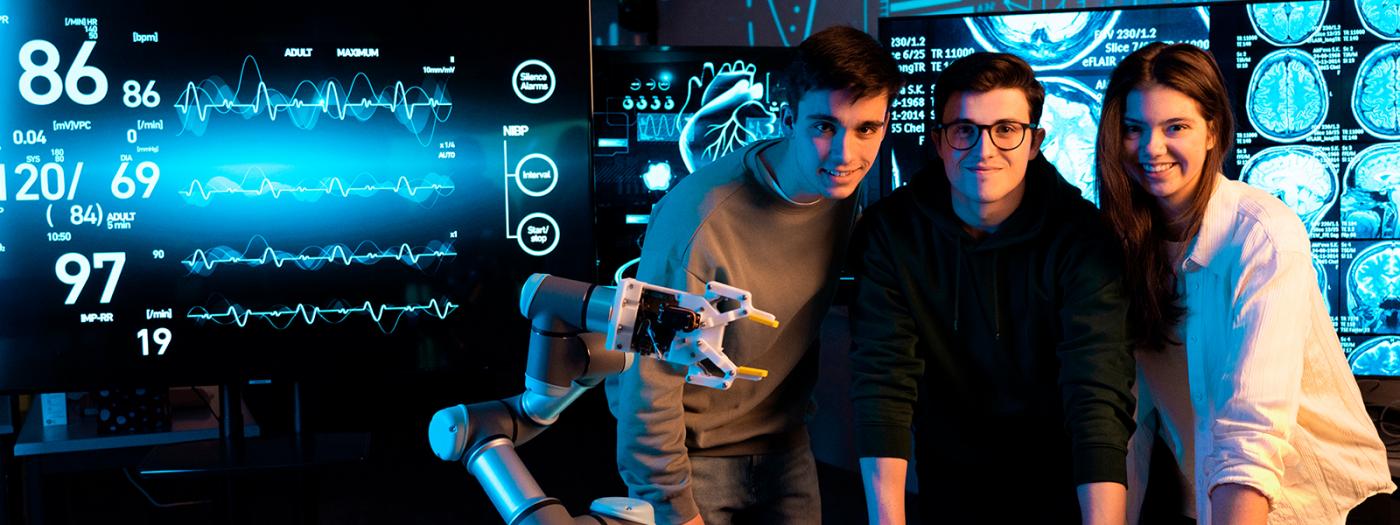Pathophysiology is a fundamental subject to understand the different clinical aspects of the most prevalent diseases, acute and chronic, from a global vision of human pathology.
The different pathologies are studied in order of the different physiological systems of the human anatomy: digestive, neurological, cardiovascular, hematological, respiratory, endocrine, renal and urinary, and finally, a special section is dedicated to infectious pathologies.
Titular Professors
It is recommended to have prior knowledge of physiology.
Students acquire the knowledge and develop the skills indicated below:
1. Describe the signs, symptoms and risk factors that determine the pathophysiological processes.
2. Know the different complementary examinations that facilitate the diagnosis and treatment of pathophysiological processes.
3. Know how to resolve clinical situations taking into account the assessment data, health problems and complications that may arise.
1. Introduction to pathophysiology.
2. Digestive pathology.
3. Pathology of the neurological system.
4. Pathology of the cardiovascular system.
5. Hematological pathology.
6. Pathology of the respiratory system.
7. Pathology of the endocrine system.
8. Kidney and urinary pathology.
9. Infectious pathology.
The classes of the subject of Pathophysiology want to enhance the active learning of students through their involvement in the learning process. In this sense, from the first day the student is an active member of the sessions and learns as he or she develops the tasks that are presented, taking the initiative in studying and reading the documents that are proposed.
Scientific bibliography (articles) are an essential element to successfully achieve the learning results of this subject.
The theoretical sessions of the subject are combined with the resolution of exercises, workshops and evaluation activities. The student is required to dedicate between 40 and 50 hours of personal study to the subject.
The student will consolidate the knowledge acquired in the sessions by carrying out some individual workshops. When carrying out these practices, the concepts worked on in the theoretical sessions are reviewed and reading the recommended articles is essential. At the same time, the student can follow the Continuous Assessment of the subject, consisting of carrying out an exercise or control after each block, in which the concepts that make up that block are reviewed.
Continuous assessment : Progress questionnaires, in class activities, Laboratory, Attendance and participation, Partial exams
Continuous assessment (40%):
Progress questionnaires (10%) (Moderately significant assessment activity)
Activities (15%) (Highly significant assessment activity)
Laboratory (10%) (Highly significant assessment activity)
Attendance and participation (5%)
Partial exams ? 30% each one (Highly significant assessment activity)
Laso Guzmán FJ . Introducción a la medicina clínica: fisiopatología y semiología. 4a Edición. Barcelona: Elsevier, 2020.
Pastrana Delgado J, García de Casasola Sánchez G. Fisiopatología y patología general básicas para ciencias de la salud. 2a edición. Barcelona: Elsevier, 2023.
Pérez Arellano JL. Manual de patología general de Sinisio de Castro. 8a Edición. Barcelona: Elsevier/Masson, 2019.
Porth CM. Fundamentos de fisiopatología. Alteraciones de la salud. Conceptos básicos. 4ª ed. L?Hospitalet de Llobregat: Wolters Kluwer Health España, 2015.
Uribe Olivares RA. Fisiopatología. La ciencia del porqué y el cómo, 1ª Edición, Ed. Elsevier, 2018.
